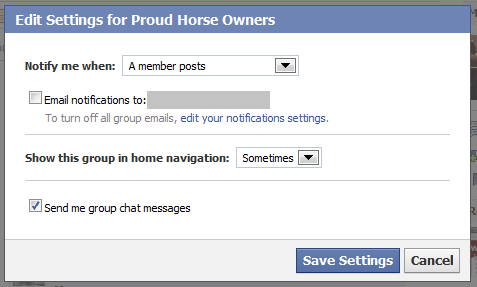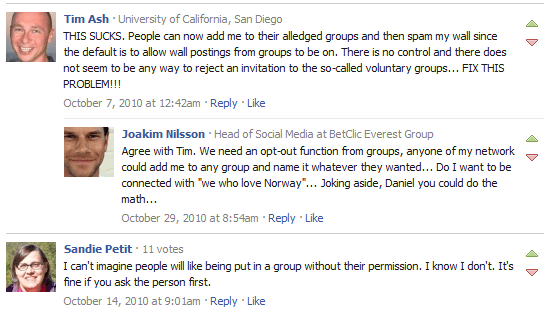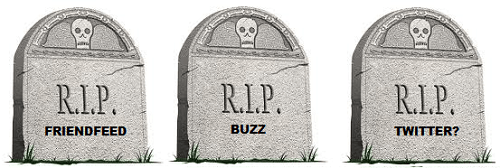Facebook launched their newer version of Facebook Groups back in October 2010. But it wasn’t until the last couple months of being personally involved in some very active and engaging Groups allowed me to see their business potential.
If you have a Facebook Page for your business, non-profit, or hobby, let me explain why you might want to consider adding a Group to that social media effort as well:
- Groups Are Stickier Than Pages
- Groups Are Fun
- Groups Are What Twitter Might Have Been
- Groups Aggregate Your Most Active And Influential Fans
Groups Are Stickier Than Pages
By sticky, I mean you get people coming back more often. One of the weaknesses of Facebook Pages is that, because of EdgeRank, you have to get a Feedback rate of 1.0% or more (2.0% to 4.4% is quite possible) for all your post types (status, photo, video, etc.) IF you want 70% or more of your fans to see your posts. Otherwise, only 20-50% of your fans are seeing your posts. That’s a lot of pressure, and frankly, there are times you want to post something that isn’t going to get a lot of interaction on Facebook.
But with Groups, every time someone posts or comments, the entire group is notified. This can get excessive, and some members may want to turn off email notifications:

We’ve already seen Facebook walk the line with privacy and user autonomy, and this has definitely been a controversial example. Maybe in the future they’ll change this. But for now, it’s a benefit to any promoter.
One of the really spammy aspects of it is that you can just add any friend to a group and they have to opt out:

This isn’t an action I recommend. It’s better to invite people to the Group’s URL via email or Page wall post than to just add people.
Groups Are What Twitter Might Have Been
As far back as 2008, people were hoping Twitter might better thread tweets into conversations that groups of Twitterers could follow. Hashtags are, in part, an inadequate solution to this. Friendfeed did a better job with it but never took off. Same story with Google Buzz. Facebook Groups solves the problem and on the most popular social media platform in the world.
Twitter has other uses and is public, but may see a drain over time as more people join engaging Facebook Groups.

Hey I don’t know, it’s possible! Facebook is already 10-20 times the size of Twitter (it’s very difficult to accurately nail down how many people are really using Twitter). But at the very least, FB Groups offer a great alternative to Twitter for easy to follow conversations.
Groups Are Fun
If the group is focused properly, it will be an amazing, fulfilling, addictive outlet for the group users. I’ve talked elsewhere about how to get better Page feedback rates by “Selling The Dream”, the audience’s #1 common passion or goal. If you make this dream the focus of a Facebook Group, you’ll have people who are very passionate talking to each other many times per day. This is the basis of every successful club in history. If Pages are the fan clubs on Facebook, then Groups are the crazy super fanatic core.
If you love Star Wars, you should be a Star Wars Page fan. If you love arguing with other Star Wars fans which Star Wars episode was the best, or in what order the six episodes should be watched, you should be in a Star Wars Facebook Group.
Groups Concentrate Your Influentials
Facebook Groups are so heavily interactive that unless you turn off email notifications and aren’t on Facebook very often, you’re going to get involved. And I mean, you’re going to read and/or post at least several times per day. Those notifications up on the globe in the Facebook navbar are like crack. In the same way that kids run down the stairs on Christmas day, that we open mail hoping for something good, that we open email hoping for some good news, we click on our Facebook notification globe to see that people like us or our comments or have said something interesting. It’s social crack.

Scientists used to dream of a perpetual motion machine, and some may still dream of cold nuclear fusion power, but in the social media realm, the Holy Grail is a simple, viral, self-perpetuating community. Facebook Groups can take a niche group’s passion and, given its aggressive notification setup, very quickly create a self-sustaining community of conversation. Read some opinion on that here.
I’ve been involved in three Facebook Groups (not counting the ones where discussion never really started), and the two most mature and successful get hundreds of comments and likes per day. A month in one of these groups feels like three months. Family members start asking what these secret groups are and if they can join. Ripple effect.
Today, I created a new Group for a Page that has 5,500 fans. I announced the new Group in a post on the Page. Within six hours (on a Sunday), I had 46 fans ask to join the group, and three separate good quality conversations going on between them.
The Business Application of Facebook Groups
So what does all this have to do with business? Well, if you have to ask, you may not understand the social media marketing process, so let me tell you how they help you.
Social media is not direct marketing. It helps you with, among other things:
- Awareness
- Customer Loyalty
- Repeat Business
- Word of Mouth
- Product Research
- Market Research
Facebook Groups can:
- Concentrate your best customers and prospects in one place
- Solidify their relationship with you
- Increase the chances they buy from you again
- Lead them to bring other prospects to you
- Give you feedback and new ideas
- Help you understand them better, which helps you market more effectively
Those may not be top priorities for a struggling or dying business (first make sure your website is getting sales and you’re getting great ROI from AdWords and organic search), but for any business that’s doing well, these things help you take it to the next level, create a competitive advantage, and secure your business’s future.





![[SEO, PPC & Attribution] Unlocking The Power Of Offline Marketing In A Digital World](https://www.searchenginejournal.com/wp-content/uploads/2025/03/sidebar1x-534.png)